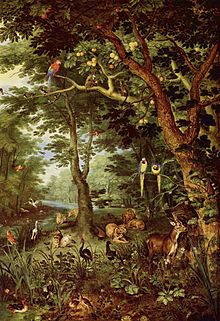Paradise
The word paradise comes from the Greek παράδεισος, paradeisos (in Latin paradisus), used in the Septuagint to refer to the Garden of Eden. The Greek term in turn comes from the Persian پرديس paerdís, 'encircled', which is a compound of paer-, 'around' (a cognate of the Greek peri -) and -dis, 'create', 'make'. Sources as old as Xenophon in his Anabasis (4th century BC) allude to the famous Persian “paradise” garden. Thus, its original meaning refers to an extensive and well-groomed garden, which is presented as a beautiful and pleasant place, where in addition to trees and flowers, caged or free animals are seen.
Etymology and history of the concept
The word "paradise" entered Spanish from Latin paradisus, from Greek parádeisos (παράδεισος), from an Old Iranian form, from Proto-Iranian *parādaiĵah- < i>walled enclosure, whence Old Persian 𐎱𐎼𐎭𐎹𐎭𐎠𐎶 p-r-d-y-d-a-m /paridaidam/, Avestan 𐬞𐬀𐬌𐬭𐬌⸱𐬛𐬀𐬉𐬰𐬀 pairi-meaning literalization. An Eastern Old Iranian word is "walled (enclosure)", from pairi- 'around' (cognate with Greek περί, English peri- of identical meaning) and -diz "make, form (a wall), build" (cognate with Greek τεῖχος 'wall'). The etymology of the word ultimately derives from a root *dheigʷ "to hit and raise (a wall)", and *per & #34;around".
In the 6th and 5th centuries B.C. C., the Old Iranian word had been borrowed from the Akkadian/Assyrian language pardesu "dominion". It later came to indicate the extensive walled gardens of the First Persian Empire, and was later borrowed in Greek as παράδεισος parádeisos "park for animals" in the Anabasis of the Athenian Xenophon of the early IV century a. C., Aramaic as pardaysa "royal park", and Hebrew as פַּרְדֵּס pardes, "orchard" (occurs three times in the Tanakh; in the Song of Songs (Song of Songs 4: 13 {{{2}}}), Ecclesiastes (Ecclesiastes 2:5 {{{2}}}) and Nehemiah (Nehemiah 2:8 {{{2}}}). In the Septuagint (3rd-1st century BC), the Greek παράδεισος parádeisos was used to translate both the Hebrew פרדס pardes and the Hebrew גן gan, "garden" (e.g. Genesis 2:8 {{{2} }}, Ezekiel 28:13 {{{2}}}): from this use derives the use of "paradise" to refer to to the Garden of Eden. The same usage also appears in Arabic and in the Qur'an as firdaws فردوس.
The idea of a walled compound did not survive in most Iranian usage, and generally came to refer to a plantation or other growing area, not necessarily a walled one. For example, the Old Iranian word survives as Pardis in Neo-Persian, as well as its derivative pālīz (or "jālīz"), denoting an orchard.
The different paradises
In Achaemenid Persia (and possibly earlier, in Mesopotamia), the term was applied not only to "landscape" gardens, but especially to royal hunting grounds, the most primitive form of wild reserve. From here the word pairidaeza was adopted, in Zoroastrianism, to designate the place next to Ahura Mazda to which the most virtuous souls were destined after the Last Judgment, within the eschatology founded by this archaic religion.
In various cultures in contact with nature, paradise is described as a land of eternal hunting, and not only in those of nomadic hunters, but also in those essentially agricultural (for example, the Egyptian Fields of Aaru or the Fields Greek Elysees).
In the Bible, paradise originally designates the garden where God places Adam after creating him (Genesis). On the other hand, Paul of Tarsus (in the Second Letter to the Corinthians 12: 4, written around the year 57) claims to have been taken away by God and taken to a Third Heaven. It should be noted that when speaking of the third heaven, they did not want to equalize paradise as such, since as previously stated, the term and its meaning apply to an earthly garden.
In the Gospel of Luke (Luke 23:43, composed around the year 80) it says that Jesus Christ said to the Good Thief: «Truly I tell you that today you will be with me in Paradise". With these words Jesus was promising the thief that he would have the opportunity to resurrect in the new world that had become a paradise.
Paradise is usually understood to mean:
- The ideal place on earth or utopia, which was once made in the garden of Eden.
- Heaven, which in some religions awaits those who are good, repent or are chosen. In the Catholic Church, the desire for paradise has been and is now a source of spirituality, the search for solitude and retreat, and in many cases evangelizing force (seeking that others may know and join their Church).
- A type of fenced garden, sometimes called paradise garden.
- The Third Book of the Divine comedy Dante.
Literature
The image of paradise appears secularized in literature in the topic of the locus amoenus, the idyllic meeting place for lovers. Bucolic poetry develops this image, turning the countryside into a mythical space in which the golden age is kept alive.
The theme of paradise lost is recurring in Western poetry. Its classic expression is the homonymous poem by John Milton. In Spanish, Rafael Alberti's treatment of the theme in «Paradise lost» (Sobre los ángeles) stands out:
Lost paradise!
Lost by looking for you,
me, no light forever.
Gnosticism
In On the Origin of the World, a text from the Nag Hammadi library found in ancient Gnosticism, it describes Paradise as situated outside the circuit of the Sun and Moon on the lush eastern Earth amid the stones. The Tree of Life, which will provide for the souls of the saints after they leave their corrupted bodies, is located in the north of Paradise next to the Tree of Knowledge that contains the power of God.
Contenido relacionado
Religion in Malaysia
Zosimus (father)
Aliya

